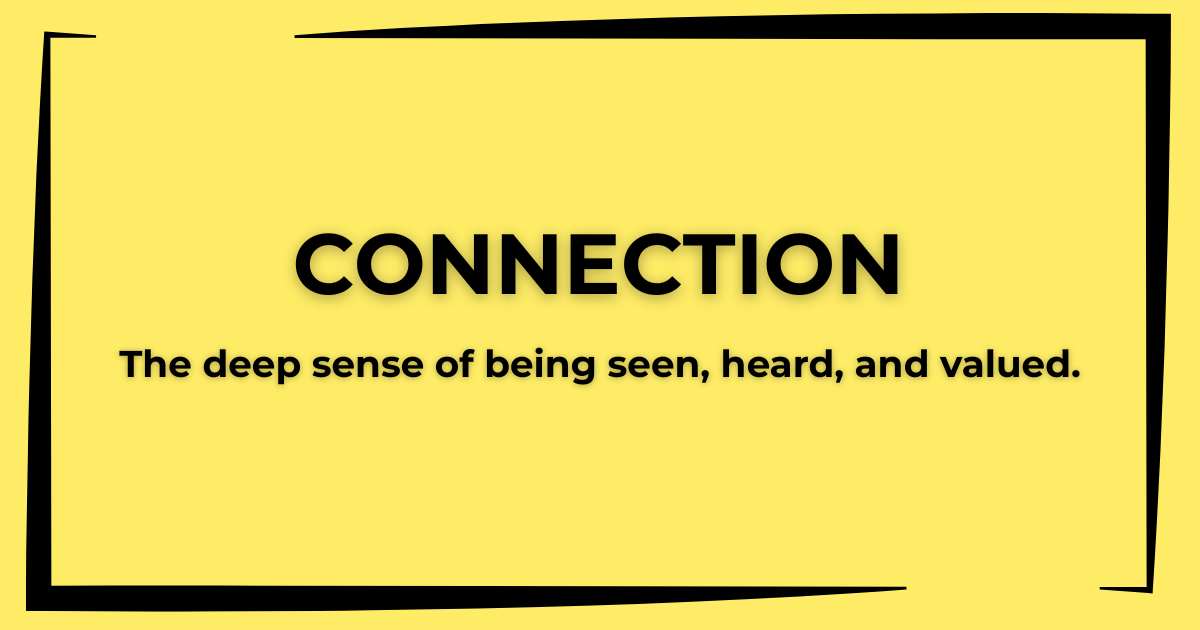We have known for many years the basis of effective education is human connection. Recent studies show that good human connections are very important outside the field of education as well.
Not only are human connections necessary for effective work no matter in what discipline we choose, but the lack of human connections also has effects on our physical health.
Studies tell us that both physical and mental health can be at risk throughout our lives If we neglect applying the important learnings on human connections. As a society, the lack of taking social human connections seriously seems to be increasing.
Studies tell us that human connections change and improve with practice.

This blog is describes several of the lessons I learned about the importance of connections while working as a teacher and while working in administration with the federal government.
These stories are of my experiences and the practices I used to meaningfully relate to individuals in my assignments. By reflecting on these experiences, I am able to share the insights I learned of the importance of connections and provide a deeper understanding the value of these types of interactions in all kinds of work.
The first story describes my experience as a Teacher and the second as a Program Analyst.
My Learning came through the interactions and reflections on the experience!
The blog is divided into a series containing three parts
* PART 1 THE IMPORTANCE OF CONNECTIONS
* PART 2 MY 2 DILEMMAS
* PART 3 WHAT I DID TO SOLVE MY CHALLENGES

PART 1
THE IMPORTANCE OF CONNECTIONS
I’ve often thought of how we seem to be losing human connections, assuming that our digital world of social media, text messages, and virtual meetings are sufficient for our well-being. But it’s not enough!
I can go through a day without talking with anyone. I can eat alone at home, get a meal from a vending machine and take it to a conveniently located park bench to eat alone, wander the aisles of the grocery store for just the right food that will entice me to eat more, all without any interaction with a human.
I can get fuel for my car using my credit card for payment. Watch television in the evening or go to a movie by myself spending the entire day without looking another person in the eyes or saying hello or thank you.
We are even teaching our children not to share with others since “this is a competitive society, and competitive skills are the important skills to teach in today’s world”, a widely accepted concept. Competitive skills, some people are convinced, should be taught instead of skills related to sharing in conversation or relationships.
We teach our children the fastest ways to use computers or smartphones or even how to see grandma on a zoom call. But none of those teach our kids to experience face-to-face interactions such as sitting with grandma feeling her warmth and caring or to negotiate taking turns using the swing at the park. Sometimes we even forget how to teach our children how or when to say “please” or “thank you”, words that are important in making and maintaining human connections.
Using words verbally helps us be clear in our communication with others and good communication Is key in making those human connections. We are less likely to make assumptions of what people mean when they speak when we are able to ask questions to express our curiosity and to be clear to others about what we are thinking.
We have so often forgotten or don’t know how to make connections with others or teach others the necessary skills.
PART 2 MY 2 DILEMMAS
TEACHER AND PROGRAM ANALYST
Dilemma A: As Teacher
The Scene
The school was what was called a junior high then but now it is referred to as middle school. My assignment was to teach girls physical education in addition to my other assigned classes. The school was in Southern California where physical education for girls took place outside in designated areas set aside for physical education classes.
The Players
- 6 or 7 immigrant 8th grade girls.
- Several teachers who taught other subjects in the school.
- Beryl Cheal (me), the new teacher.
What Happened: The Problem
On arrival on the first day of school I was informed by several Teachers that I would be teaching girls who were known to be troublemakers.
Because of that, I was advised not to include them in any of the teams that I put together or include them in any other activity where students might be involved. This advice was given because of their bad, unacceptable behavior.
The other Teachers wanted to warn me not to give the “bad” girls any privileges like participating in athletic teams. They advised me that “those girls” would be going to juvenile hall soon anyway and to that before they left they would certainly cause more trouble.
The girls had a history of misbehaving, not coming to class, not studying, getting terrible grades (if they even turned in their assignments), and were not interested in school. So, just to be safe and leave them out.
My Dilemma
- Listen to the advice of the Teachers and not allow the participation of the “bad” girls.
OR
- Treat the “bad” girls as I would any other student. And take my chances!
Dilemma B: As Program Analyst
The Players
- Rose – The Head Start Director in small rural community
- Beryl Cheal (me) – The Program Analyst working with the Federal Government.
The Scene
My job as the Program Analyst was to interpret the Head Start standards and regulations and find ways to assist Head Start programs in following those requirements. The work was through the newly established Region 10 Head Start Office operating as a part of the 1975 War on Poverty.
The work was basically requiring established Head Start programs to serve low-income children of Head Start age. At that time the Head Start age was stated as “preschool” age and was assumed to be 4 to 6 years old.
Each program was required to follow the program standards for the budgets that paid for all Head Start program expenses, with in-kind contributions from the community. Budgets were required to be approved by the Region 10 HS office after having been approved by the local Head Start program’s Parent Policy Council.
My job as a Program Analyst was to make sure local programs were following the legal fiscal and programmatic standards and requirements as described by the office in Washington DC.

What Happened: The Problem
As a Program Analyst for the new Region10 Head Start Office one of my duties was to assist programs in the administration of their programs. Part of that process was for the local program to submit a budget for Regional Office approval and funding.
One day as I reviewed the budget for this program, I realized that some of the costs they were including were for programming for teenage children in addition to the Head Start costs.
When I questioned the Director about those costs, she told me there was a great need in their community for services for older children and since they would have more Head Start funds than they really needed they were planning to use those extra funds to establish a teenage program.
The use of money in that way was unacceptable by Head Start standards and requirements.
All Head Start programs were required to not only serve the children but include a Parent Involvement element which, in part, included the Head Start Parent Policy Council. That parent organization was required to approve the budget and programming before the requests went to the Regional Office for funding.
When I asked Rose, the Director, whether that had been done she said “Yes”.
Over a few months time with my frequent questioning about the legality and appropriateness of using funds for other than Head Start, Rose sent many communications to my boss explaining my inappropriate requests of her and please would my boss replace Ms. Cheal (me) with someone who was easier to work with and more competent.
My boss did not respond to Rose but kept me at the job I had been assigned.

Knowing that the use of Head Start funds was required to be used only for Head Start programming, I became dissatisfied with the continued insistence on the part of Rose to use funds inappropriately, so I eventually made arrangements to visit the program and talk with those involved. I especially wanted to know whether the Parent Policy Council had approved the budget that had been submitted. I knew that when the annual audit occurred, it would be found those funds were being used for other than Head Start programming and that program could be shut down.
I didn’t want that to happen so I decided to talk face-to-face with parents and staff.
In my request for the initial meeting I specifically asked there be a room for meeting with the parents. I specified that the participants at this meeting would include only parents and no staff.
On arrival I found the room with many parents waiting as well as many staff intending to stay. When I reminded Rose that I had requested no staff attend the meeting her response to me was “CARRY US OUT!”
My Dilemma
- Go home immediately and make arbitrary administrative budget changes and their descriptions for any programs other than Head Start.
OR
- Stay in the community overnight setting up a meeting with Rose for the next morning to try to work out an amicable solution…. And believe the possible!


